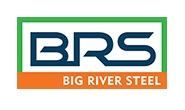Market Segment

September 17, 2017
Will Big River Disrupt the U.S. Steel Market?
Written by Tim Triplett
Editor’s note: Mario Briccetti of Briccetti & Associates, a supply chain consulting firm, offers the following commentary:
I had the opportunity to interview the CEO of Big River Steel, David Stickler, at Steel Market Update’s Steel Summit Conference in August. Much of the conference was focused on trade issues, but Mr. Stickler’s remarks struck me as being just as important to the U.S. steel industry. It could very well be that BRS will be a major disruptor in our industry. Here’s why:
First, BRS has a disruptor’s mindset. The domestic steel industry fought to prevent them from ever getting started, so it’s just natural that the BRS culture starts off with an “us vs. them” mindset. The theme for their plant opening was “Rebels Wanted.” You can really see evidence of this attitude in the recent letter sent to President Trump on tariffs—BRS did not sign it. When SMU Publisher John Packard asked Mr. Stickler about that, he said BRS was never asked to sign the letter and that the first time he saw the letter was when it was made public!
Second, Mr. Stickler told me that anyone at BRS who says, “That’s the way we have always done it,” is committing a major error. He wants everyone at BRS to challenge every precedent and decision to push themselves to optimize their operations.
Third, Mr. Sticker wants BRS to be known as a technology company that happens to make steel. They are embracing Artificial Intelligence and Big Data, which is already paying dividends, he said. He also said that BRS is attracting people to the steel industry because they see a growing and progressive company—a rarity in our industry.
Fourth, BRS is going to look for the right kinds of customers—customers who also don’t accept the status quo. For example, BRS is the only flat rolled steel mill serving on the Association of American Railroads Steel Task Force Committee; all the other mills involved are plate mills. BRS is promoting the use of high-strength sheet instead of heavier plate so rails cars can shed weight, carry more cargo load and still meet the government’s improved safety standards.
Finally, Mr. Stickler talked about how open BRS is about its operations (and how his competitors are not). He pointed out that foreign competition is not the only threat to the American steel industry; alternative materials (of which aluminum is just one) have taken market share away from steel. His hope is that BRS will lead the industry to stretch its view of steel’s capabilities and, through competition, lift the entire industry. Here’s hoping his vision makes a difference for the steel industry.







